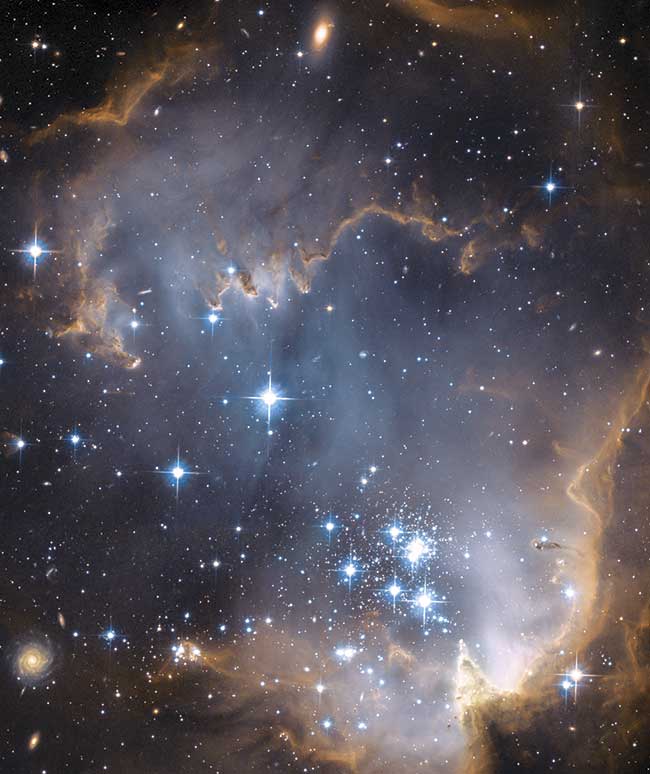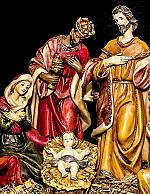Day 16. The holy one

[above: Young stars in a nebula in the Small Magellanic Cloud—NASA, NGC 602 and N90 in the Small Magellanic Cloud]
Suddenly an angel of the Lord stood by their side, the splendor of the Lord blazed around them, and they were terror-stricken. But the angel said to them, “Do not be afraid!”. . . And in a flash there appeared with the angel a vast host of the armies of Heaven, praising God, saying, “Glory to God in the highest Heaven!” (Luke 2: 9–10, 13–14 J. B. Phillips New Testament)
The famous saying “God is love,” it is generally assumed, means that God is like our immediate emotional indulgence, not that the meaning of love ought to have something of the “otherness” and terror of God.
—Charles Williams, He Came Down from Heaven
In these few words, Charles Williams eloquently captures the paradox of the Incarnation. God is love: we see this powerfully embodied in the way he chose to come to us—in the incarnate form of a tiny, vulnerable baby. Indeed he is Emmanuel, “God-with-us”—not remote or far away, but here and now, come to us in the humble surroundings of a lowly stable, not in a palace or on a throne.
At the same time, the glorious “other,” of which Williams writes, is also present. It can be seen when “the splendor of the Lord blazed around [the shepherds] and they were terror-stricken” and in the angelic host filling the night sky, proclaiming “Glory to God in the highest.”
Throughout Scripture encounters with the transcendent are so striking, so frightening, that those involved are inevitably told: “Do not be afraid.” Even Moses, for all of his intimacy with God, was still unable to see the face of God in the fullness of his glory, and live.
In his seven novels, Charles Williams often depicts the great fear that arose when his fictional characters encountered the transcendent. As an Anglican he was well-versed in a liturgy that acknowledges the loving accessibility of God as well as his holiness. Thus Williams would have embraced the necessity of incorporating both elements in our worship and knowledge of God: the tiny incarnate baby and the overwhelming glory.
Because God is love, “he came down from heaven: by the power of the Holy Spirit, he became incarnate from the Virgin Mary and was made man,” as the creeds say. And only through the loving, atoning work of Christ, the incarnate one, can we, as sinful, finite beings, approach the throne of the Most High, the glorious, righteous Holy One.
Thanks be to God.
PRAYER: Enable us to bring your love, Lord, into the ordinary everyday reality of our lives so that others might begin to see your transcendent Glory shining forth even in this dark, broken world. Amen.
By Marjorie Lamp Mead
[Christian History originally published this article in Christian History Issue #133+ in 2019]
Marjorie Lamp Mead is associate director of Marion E. Wade Center at Wheaton College, Illinois, where much of her work has focused on Sayers and Lewis.Next articles
Day 17. Blessing Our Complicated Life
In Jesus, God entered the community of creation so that creation could enter the community of God.
Emily Ralph ServantDay 18. The glory of the Christmas night sky
However dark our darkness, the shadow that breeds it is just a vain and passing thing.
Matthew DickersonDay 20. The person of Christ
Sayers’s advice to focus on the person of Christ makes absolute sense.
Mark A. Noll







